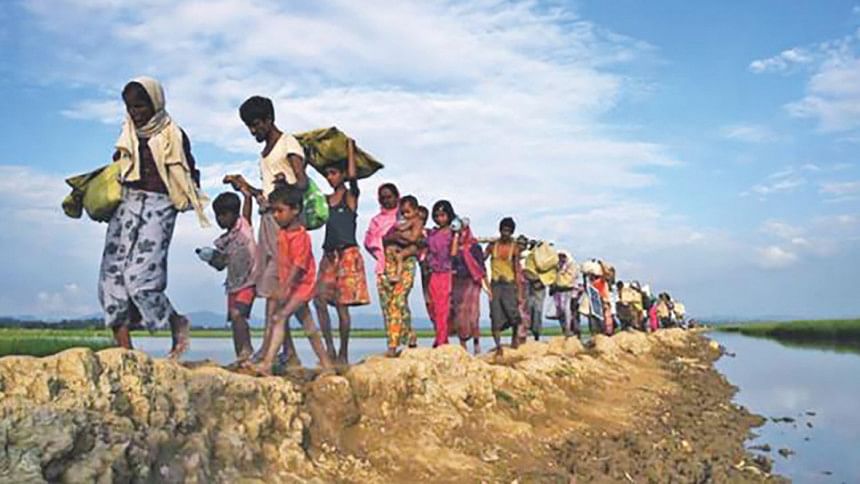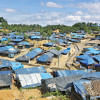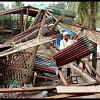Left in the lurch

With the Rohingya repatriation nowhere in sight, their leaders say they feel ignored both by the international community and the Bangladesh government in the process of making decisions about their fate.
Community leaders in refugee camps and those living abroad are raising their voice about the matter recently, urging all the parties to ensure their representation in the negotiation process about repatriation.
The issue was also highlighted in a letter to Prime Minister Sheikh Hasina by the Ara-kan Rohingya Society for Peace and Human Rights (ARSPH), a Rohingya organisa-tion based in Kutupalong camp.
The letter was emailed to her office on June 18. The organisation also handed over a copy of the letter to Mohammad Abul Kalam, Bangladesh’s Refugee, Relief and Reha-bilitation Commissioner.
“Rohingya communities receive many confusing messages and information about their repatriation. Often, some international agencies say that we will not go back to Myanmar. This is totally wrong,” said Mohibullah, chairman of ARSPH.
His statement echoes what Hasina said on June 9. She said international agencies that came to Bangladesh to offer voluntary services did not want the displaced Roh-ingyas to go back to their homeland.
Mohibullah said the international community did not care about what the Rohingyas wanted. “They are not really listening to us,” he said yesterday, on the eve of the World Refugee Day.
The day is being observed today when some 1.1 million Rohingyas, including the 741,000 who fled military crackdowns in Myanmar’s Rakhine state since August 2017, live in squalid camps of Cox’s Bazar and their repatriation is still uncertain as Myanmar has yet not created conditions for their safe return.
The situation has worsened as clashes between Myanmar military and Arakan Army, an ethnic Buddhist rebel group, have escalated since early this year.
Bangladesh signed a repatriation deal with Myanmar in November 2017.
Myanmar also signed a tripartite agreement on the repatriation with the UNDP and the UNHCR in June last year and extended it this year. But many Rohingyas say Rakhine is not safe yet and that there is no guarantee of citizenship and freedom of movement there.
Last year, UN investigators demanded top military commanders in Myanmar be investigated and prosecuted for the “gravest” crimes against civilians under international law, including genocide, but the UN Security Council has yet to refer Myanmar’s case to the International Criminal Court mainly because of opposition from China and Russia.
Though the living conditions in the camps in Ukhia and Teknaf have improved a lot compared with that in 2017, a lack of secondary education and unemployment among Rohingya youths are disturbing them, Rohingya activists said.
Mohibullah said Rohingyas were concerned that the international community was not focused enough on what Rohingya refugees want. They are concerned more about humanitarian assistance, rather than repatriation.
He added that before signing the deal with Myanmar, the UNDP and the UNHCR did not speak with any of the Rohingyas. Also, there was no representation of the Rohingyas in the deal signed between Bangladesh and Myanmar in November 2017.
“Even our ethnic name Rohingya is not mentioned in the deal signed by Myanmar, the UNHCR and the UNDP. The Asean team that recently prepared an assessment report on the situation in Rakhine also did not use the term Rohingya. The Asean has not consulted any of the Rohingyas either. This is very painful,” Mohibullah said.
He said there were big challenges on the road to return home, but all those could be overcome with coordination and collaboration of the Rohingya people.
Rohingya representatives can help here by participating in the planning and decision-making process, and it would help improve communication between Rohingyas and all other parties, he added.
In its letter to the PM, the ARSPH requested her to give them the opportunity to work with the Bangladesh government to help the Rohingya return home.
“We would like to be able to discuss with your office about how we can work more effectively together to ensure repatriation of the Rohingyas in safe, sustainable and dig-nified way,” it said.
Nay San Lwin, campaign coordinator for Free Rohingya Coalition, a global network of Rohingya activists, said there was a big Rohingya diaspora in different countries, but the UN has not consulted any of them while working on repatriation and other issues.
“We suffered genocide. Now they [international community] are deciding our future without our consent,” he told The Daily Star from Germany yesterday.
There are some 130,000 Rohingyas living in camps in Rakhine. They should be issued citizenship and settled in their original homes before repatriating the Rohingyas from Bangladesh, he said.
Lwin said foreign dignitaries go to the camps and talk to them, but they are nowhere in the scene during negotiations with Myanmar.
“We feel completely ignored. It seems the international community wants to please Myanmar,” he added.
Abul Kalam, Bangladesh’s Refugee, Relief and Rehabilitation Commissioner, said Bangladesh government tried to incorporate opinions of the Rohingya communities before making any decision.
“We will try to do it more,” he added.
In an email message, UNHCR’s Bangladesh Representative Steven Corliss said the UNHCR and its partners were working across the Rohingya settlements in Cox’s Ba-zar, and they spoke with many refugees every day.
“The majority of refugees tell us that they want to go home, when voluntary, safe, dignified and sustainable repatriation is possible. We share this goal and are working toward this objective, along with the government of Bangladesh,” he said.
Only the Myanmar government can make the changes needed to give them the confidence to return, he noted.
“The UNHCR will continue to work to preserve the right of Rohingya refugees to return and, in this connection, to try and improve the conditions in Rakhine State. We will also continue to discuss with the Rohingya community in Bangladesh their views and aspirations for the future, and provide assistance and protection to them until solutions can be found,” he said.

 For all latest news, follow The Daily Star's Google News channel.
For all latest news, follow The Daily Star's Google News channel. 








Comments